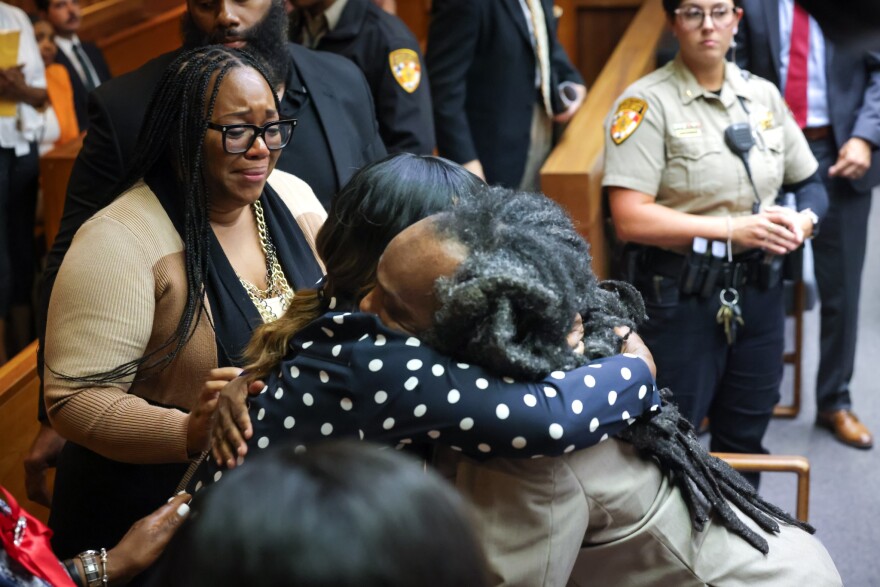Benjamin Cole spent 27 years - most of his life - in prison for a murder he has maintained he did not commit.
Cole was convicted in the 1998 murder of Calvin Jenkins in Greensboro despite his defense team not having access to records that supported his innocence.
The Wrongful Convictions Clinic at Duke University's Law School took on his case in 2021 and earlier this summer, Cole was released from prison.
His release comes as the state Senate considers eliminating the North Carolina Innocence Inquiry Commission, which investigates claims of wrongful convictions.
WUNC's Will Michaels spoke with Jamie Lau, the clinic's supervising attorney, and Britney Pearson-Norfleet, Cole's sister, about his case.
The conversation has been lightly edited for clarity and brevity.
Britney, I can only imagine what was going through your mind when you first heard that your brother was going to be released. But can you take me back to that moment and tell me what you were thinking?
So there was never a moment until the moment he was released, that I knew what would occur. We prayed, we hoped, but the second that Judge Bray said that he would be released, I literally felt like these chains broke. That's what it felt like: a release from being imprisoned myself.
Jamie, what were these records that pointed toward Benjamin Cole's innocence, and then how was the case resolved?
Mr. Cole always maintained his innocence and said that he was in Ohio at the time that the homicide occurred. Investigators went to Ohio to visit a music studio where Mr. Cole had said he was recording the evening that the homicide took place in Greensboro.
What they found there, and was documented in the Greensboro Police Department file, was an employee discussed payments that were made to the studio, including an apparent payment from Mr. Cole on the very night that the crime occurred in Greensboro. That payment also corroborated testimony from the studio engineer. Despite his insistence that Mr. Cole was there, the jury apparently didn't believe him, but the records from the studio itself, once they were disclosed, supported everything that that studio engineer had said. And of course, if the jury had those records, obviously Mr. Cole never would have served 27 years.
Jamie, correct me if I'm wrong, but there was more that came to light during evidentiary hearings earlier this year too, right?
Yeah, there's certainly more. Two women identified Mr. Cole when looking through photos that they were being shown at the Greensboro Police Department. They were in the apartment where the intruders came into the home and ended up shooting Mr. Jenkins. They reviewed 1,600 photographs of Black males in Greensboro before identifying Mr. Cole as the assailant in the case. There's never any additional evidence collected, never any physical evidence, no murder weapon, no confession. It was all the evidence ever collected in the case.
But the problem was no one ever asked the woman whether or not Mr. Cole could be the assailant, given that he had a very thick Jamaican accent. Very early on in our efforts, we went to those two witnesses and said, if Mr. Cole has a Jamaican accent, was it possible that he could have been one of the individuals in the apartment that night? And both of them said no, unequivocally.
Jamie, the prosecution offered an Alford plea, which is not the same thing as a full exoneration, but can you parse out the differences between those and how the case was resolved?
An Alford plea allows an individual to maintain their innocence but accept punishment for a crime that the state has accused them of. The Alford plea guaranteed that he would be released.
Obviously, it's a real difficult thing to do to accept that resolution, but in many conversations with Mr. Cole. and his family, everybody just wanted him home, and we were grateful that we were able to help facilitate that.
Britney, your brother was released less than a month ago. What have these past three weeks or so been like with him?
Prison? It has an effect on on people. And what I'm seeing now with my brother, he has the comfort of home. He has family surrounding him. However, he doesn't know us. 27 years later, he has to learn us, and we have to learn him.
There has been a lot of loss. We no longer have grandparents living. And to protect his mental health, we did not tell him these things while he was incarcerated. He's learning his new nephews and nieces who, none of them are babies. He's also a grand uncle now.
So to see that it's like he has to learn so much and to catch up. But I've always told my brother that I will fight for him from Day One until I couldn't fight anymore, and that means even now, I will continue to fight for him, to teach him to be able to enter back into society.







